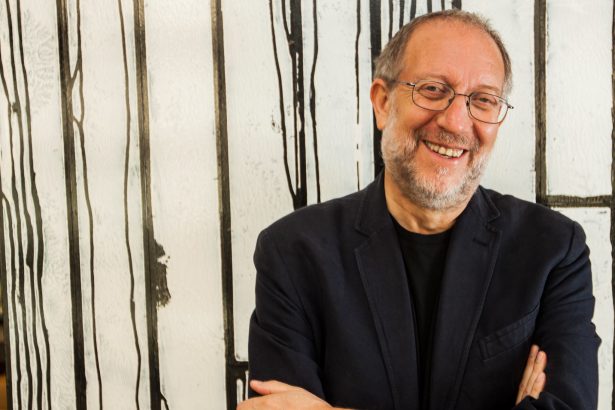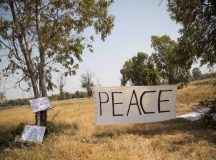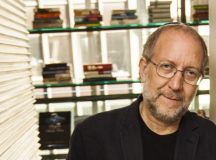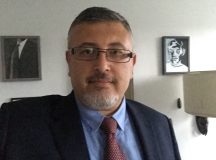Yossi Klein Halevi is senior fellow at the Shalom Hartman Institute in Jerusalem and the author of the recent New York Times bestseller, ‘Letters to my Palestinian Neighbour’. In conversation with Fathom deputy editor Calev Ben-Dor, he sets out the main themes of his book: the need for both sides need to stop the war on the legitimacy of each other’s narrative, and the need for a radically new kind of Israeli-Palestinian conversation about the conflict based on respect and deep mutual recognition. Download a PDF version here.
Telling our story
My book originated in the 1990s when I undertook a year-long journey into Palestinian society, specifically into its religious life, going to mosques and monasteries looking for shared devotional language with my neighbours. I was exposed to the Palestinian narrative and to Palestinian stories which deeply moved me and helped shape my thinking about the conflict. And in this book I’m asking my neighbours to hear my story – not through a tit-for-tat argument, but because minimal respect of the right of each side to tell its story is, I believe, a prerequisite for peace. This isn’t primarily a conflict over tangible issues like borders and settlements – those are the consequences of a deeper conflict over narratives. We’ve been fighting a hundred-year war of clashing narratives.
I felt the time had come for someone on the Israeli side to try to explain our story to our neighbours, to tell a story about who we are. So I told my own story – an American-born Jew who moved to Israel as part of a people returning home to a land that has been at the centre of its identity for 4000 years.
The book also came out of the realisation that the other side doesn’t know our story. The Palestinian media and school system overwhelmingly convey the message that Israelis and the Jewish people are not only thieves but also liars. They say we’ve invented our story, or that we have no story. That’s the message Palestinians receive on a daily basis. A young man in Hebron, the city with the longest Jewish history of any city anywhere, once told me that there were no Jews in the city until after 1967. But he was simply repeating what he’d been told his whole life.
One part of the Jewish community defends the Israeli, Zionist narrative which is under growing assault. Another part of the Jewish community defends the two-state solution and the hope for peace. The implicit premise of my book is that both these approaches are necessary and, more, they are complementary. If we don’t defend the integrity of the Israeli story and the legitimacy of the Jewish presence here, we’ll never reach peace. If the other side is convinced we have no story or roots here – which is what they hear over and over – peace will not be possible. How do you make peace with a non-existent illegitimate people?
On the Palestinian side there is an impression that we are a foreign implant. And on our side, especially on the Right, there is a tendency to see the Palestinians as the successor to a long line of genocidal enemies against the Jewish people. Each side projects its deepest historical trauma onto the other. Rather than see a struggling people on the other side that is holding on for dear life to a sliver of land, we see monsters.
A prerequisite for peace is for both sides to stop the war on the legitimacy of each other’s narrative. We disagree about everything, from where we are each descended from, what the roots of the conflict are, right up to the latest events on the Gaza border. We have completely opposite readings of the same reality and that may never change. But my aim with this book is to create a space where we can at least begin a painful process of listening to each other’s deeply unpalatable narratives, to model a different kind of conversation based around a Palestinian and Israeli sitting down and telling each other their stories.
The criticism I’ve received from some on the Left is that, given the extreme power imbalance between Israelis and Palestinians, what right do I have to expect the occupied to listen to the narrative of the occupier? I understand this critique, but it misses several key points that are unique to this conflict. The first is that the occupiers are worried about their own long-term survival. When the French were debating whether to leave Algeria, no one argued that withdrawal would threaten France’s ability to defend itself. In Israel, a credible case can be made that withdrawing to nine-mile-wide borders in the most unstable region on the planet could be an existential threat. Our dilemma is that we face opposing existential threats – from withdrawing and from not withdrawing. Many Israelis have two nightmares about a Palestinian state. The first is that there won’t be a Palestinian state and the status quo continues indefinitely. The second nightmare is that there will be a Palestinian state, and we may not be able to adequately defend ourselves in a disintegrating region. For many of us, the debate isn’t between peace and occupation but over the question of which existential threat is worse.
Israelis carry in their heads a split screen: On one side there’s Israel versus the Palestinians, and we are Goliath and they are David. But on the other side of the screen, Israel is David against the Arab and Muslim world Goliath.
Ending the occupation means addressing Israeli anxieties. And nothing provokes those anxieties more than the ongoing Palestinian campaign, with growing support around the world, to deny our history and legitimacy and roots in this land. Consider the UNESCO resolutions that speak of East Jerusalem as being significant to Islam and Christianity and leave out Judaism. Israelis see that campaign and conclude that there is no chance that a Palestinian state on the West Bank will live in peace with a Jewish state it regards as inherently illegal and illegitimate. Those fears of course strengthen the Israeli Right. The boycott, divestment and sanctions (BDS) movement is the greatest gift to the Israeli Right.
And so explaining and defending our narrative isn’t abusing the power imbalance between Israelis and Palestinians, but the opposite. Without some Palestinian willingness to stop the assault on the Jewish narrative, Israelis will continue to view peace as a dangerous illusion of the Left.
Engagement with the Arab World
We have created an Arab language website for the book and I am looking to do serious outreach to Palestinian society and to readers in Saudi Arabia, Egypt and Jordan. We are at a turning point in the Middle East where fear of Iran is creating unexpected alliances of convenience between Israel and Sunni states. My hope is that this book can deepen those alliances by creating a conversation about who the Jews are, our place in the region, and Israel’s legitimacy. I think there are many people in the Middle East who are ready to hear our story in a way that they weren’t before.
It’s an interesting and complicated moment. On the one hand relations have never been worse between Israelis and Palestinians. And yet relations have never been so hopeful between Israelis and the Arab world. My hope is that we can turn what is now a purely strategic relationship into the beginnings of something deeper, which can then have positive consequences for the Israeli-Palestinian conflict.
Everyone realises that unless there is some significant progress on the Palestinian front, the Arab states won’t be able to move significantly in our direction (even though they apparently want to). And in light of this, we need to figure out ways of changing the conversation. What I’m suggesting here is one way.
A Zionist story for the 21st Century
The book has three components. The first is a discussion of the importance of telling a 21st century Zionist narrative. The narrative we’ve been telling ourselves and the world is really a Eurocentric 20th century story, one that begins with the pogroms in Czarist Russia and culminates with the Holocaust.
Yet this is no longer tells the story of Israel today. It doesn’t reflect an Israeli society in which the majority are descended from families who emigrated, fled or were expelled from one part of the Middle East and came to another. These Jews are mainly excluded by the Holocaust-centric story. And this story also inadvertently feeds the anti-Zionist narrative of Israel as a colonialist European intrusion.
Israel’s founders responded to the region’s rejection of the state’s legitimacy by saying we’re really not part of this region anyway. But if you look at Israeli culture today, from food to music to slang, we are Middle Easterners, to some extent. Yes, we are a meeting point of different cultures but we are increasingly part of this region. I believe that an essential precondition for peace is not only the Arab world seeing Israel as part of the region, but for Israelis to see ourselves as part of the region as well.
Israeli centrist sensibility
The second component of the book makes the case for an Israeli centrist-mainstream approach to peace-making. The centrist camp, to which I belong, wants a two-state solution for Israel’s sake, but deeply distrusts the intentions of the Palestinian leadership, and regards the Israeli Left as too willing to sacrifice Israeli interests.
The centrist Israeli believes there isn’t any chance for a viable Palestinian state to emerge any time soon and that there is no indication that the Palestinian national movement has moved one centimetre closer to accepting our legitimacy that it did before the Oslo process began.
But the centrist Israeli also believes we need to stop moving reality towards a one-state solution which is what current Israeli policy is doing. We need to pause, stop building all over the map, and think of ways in which we could be laying the ground for a long-term two state solution.
My starting point is that all the area between the Jordan River and the Mediterranean Sea belongs to me by historical right. The problem is that there are another people between the river and the sea which makes the same claim. So while my starting point is no different from the settlers, my end point is very different, namely that I have to sacrifice part of what legitimately belongs to me for the sake of accommodating a counter claimant who believes what I believe about the land.
I need to make the same kind of painful sacrifice that I’m asking the Palestinians to make which is to give up part of the land which belongs to them. But from a practical perspective we can’t have a situation where two parties are negotiating and one side believes it’s all theirs and the other says ‘well it’s not really all ours, were occupying part of this’. So for practical reasons alone we need an Israeli negotiating posture that begins with a right-wing perspective but that ends with compromise. I think one of the great disappointments of the ‘Netanyahu years’ is that he hasn’t moved us closer to that model.
I have deep appreciation for the secular Left, for its historical role in creating the state and its courage in recent years to hold up the goal of a two-state solution even as more and more Israelis stop believing in the possibility of peace. But I don’t believe the Left will bring us to peace without carrying the mainstream and there is a growing bitterness on some parts of the Left (certainly on the far Left) where I believe they are cutting themselves off from the Israeli ethos, which is extremely dangerous not just for the Left itself and Israeli democracy but for the possibility of peace.
Reinserting religious language into the conversation
The third component of the book argues for the necessity of bringing religious language and voices into peace-making.
The book is very deliberately written from a religious Jewish perspective and explains Zionism from this perspective because in my experience of working with American Muslims, a secular discourse has no chance of speaking to Muslims. One of the big mistakes the Israeli Left has made is to bypass our religious sensibilities and try to create an artificial peace between secular elites. But this doesn’t work in the Middle East and we need to create a religious language for peace and bring religious elites into the peace making process.
A model for an internal Jewish conversation
These components in the book are also an attempt to create a model for a new kind of internal Jewish diaspora conversation as well, to break the left-right stalemate and offer a coherent centrist perspective which too often tends to get lost in the Jewish conversation. When I speak to American Jewish communities I sometimes feel like I’m in some kind of a time warp. Orthodox right-wing communities make me feel as if it’s the 1980s, Menachem Begin or Yitzhak Shamir are prime minister, the First Intifada hasn’t happened yet, and Israel just needs to keep building facts on the ground because all the land is ours and eventually the Arab world will accept it. And Liberal Jewish communities make me feel as if it’s the 1990s during the good old days of Oslo, the Second Intifada hasn’t happened yet, and all we need to do is to stop building settlements and sign the damn piece of paper, because we have a peace partner, we all know what the deal is and then we’ll live happily ever after. Most Israelis today are no longer ideologically greater Israel or peace now but much of the diaspora, certainly in America, still seems to be divided along those two camps.
Responses to the book: Raja Shehadeh’s Straw Man
The book received some positive responses from Palestinians who said they were ready to accept the fact that there are two stories here and this land needs to accommodate both (although they also asked me not to use their names). Apparently, that isn’t a position that one can say publicly in Palestinian society today, which is a tragedy not only for us but for them. I also received a long letter from a Jordanian who ends by asking: ‘What the hell took you guys so long to finally begin explaining yourselves to us?’ We as Israelis go out of our way to try to explain Israel and Zionism to Europeans and Americans – and even to Chinese – but we hadn’t bothered trying to explain ourselves to our neighbours.
The book also received a variety of criticism with some claiming it was an attempt to deflect attention away from Israeli crimes. Rajah Shehadeh, the well-known Palestinian writer, wrote a review in the New York Times accusing me of imposing preconditions that ‘Palestinians must become Zionists’ in order for the occupation to end. Yet that was not my intention at all. In fact, I explicitly write that I’m not asking Palestinians to replace their narrative with mine, just as I’m not intending to replace my narrative with theirs.
There is a great difference between being willing to hear the narrative of the other side, acknowledging that it exists, and embracing it. So unfortunately I believe Raja set up a straw man and knocked it down. This was personally disappointing to me because I had been very affected by Rajah’s own work which really helped shape my own understanding of the conflict. And just as I was able to hear his narrative without changing my love and connection to my own narrative, I hoped my book would facilitate that on the Palestinian side.
I understand that what I’m doing is not easy for Palestinians. But I’m convinced that this is a primarily a conflict over narratives. It’s also clear why would-be peace-makers have tried to avoid this issue. But if that’s what this conflict is about – existence, legitimacy, historical memory, fears – and we don’t start dealing with those things, those intangibles, then we will never reach a solution.
‘Letters to my Palestinian Neighbour’ can be purchased here.





































